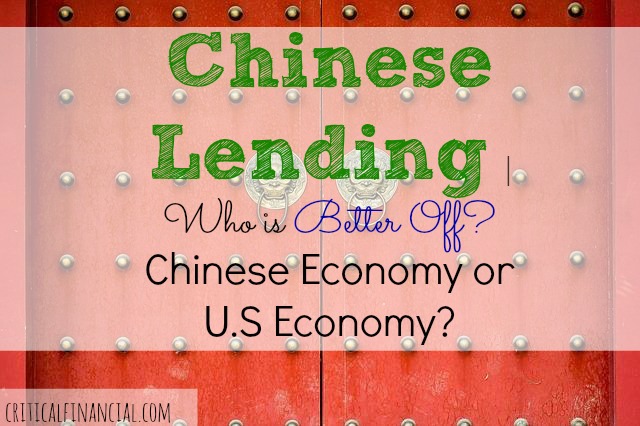
In case you haven’t noticed, the U.S. Economy has been quite heavily dependent on the People’s Republic of China’s purchase of U.S. Treasury bonds to finance the interest on our federal budget deficit. If the Chinese ever stopped buying those bonds, the U.S. economy would suffer a huge blow. But, then again, so would the Chinese economy and every financial system on the planet, many of which ride on the coattails of U.S. strength.
That begs the question: who is getting the better deal in this financial transaction? The opinions are almost as numerous as the Chinese. Here are a couple of facts to help you decide on your response:
China has a more long-term view of its future
According to most cultural and economic analysts, China has a more long-term view of its future and its economy. That is why it is willing to wait out the ups and downs of the U.S. economy as it buys our bonds. It is banking on a time when it will not have to lend so much money to the States, but for now it needs to do so because …
China’s huge export of manufactured goods
Much of the vibrancy of the Chinese economy can be traced to its huge export of manufactured goods to the U.S. In other words, if Chinese lending to the U.S. ceased, Americans’ ability to buy all sorts of Chinese goods would be seriously hindered, which would slow the Chinese economy to a crawl. In fact, China’s economic “miracle” is due in large part to export volume that has doubled twice in the 21st Century. Much of that miracle’s cause can be traced to U.S. purchases. Thus, the Chinese lending money to the U.S. has created a co-dependent relationship.
The U.S. is still the biggest spender of consumer goods
If you are China, you of course would like to find other customers for your exported goods and perhaps other nations to lend money to, but where exactly would you turn today? Europe? Africa? Perhaps India, but none of these candidates have the size and health of the U.S. economy. So, no matter how often China makes allusions about stopping the purchase of U.S. bonds, don’t believe it. The U.S. is still by far the biggest spender on the block, and it is getting bigger as other countries spiral into economic chaos and the EU threatens to shatter.
Americans in worse financial shape
From the U.S. side, we still need China to continue to maintain its #1 spot at the top of the list of U.S. Treasury bond holders to continue to pay off the $450 billion-a-year interest on the national debt, especially as tax receipts dip due to most Americans being in worse financial shape than they were a few years ago. The moment the Chinese decide to stop their massive transfer of money to the U.S., the federal budget deficit hits 20 Trillion, is the moment people begin to march on Washington due to dire economic adjustments that will have to be made. Our currency would have to be devalued and inflation would seize the day; we would basically have to make the same adjustments that places like Greece have had to—how are its citizens responding?
China’s culture built on avoiding shame
As our national debt approaches $16 trillion, everyone, including China, is wondering if we will be able to pay off that debt, and if so, with what value to the dollar? If we de-value the dollar to be able to pay the debt, then in one stroke of the pen, China’s investment in us loses considerable value and they look like idiots. In a nation that has a culture built on avoiding shame, it is impossible to put a dollar value on that sort of embarrassment to China.
In light of the five facts above, the U.S. and China will continue to fire empty shells across the bow when they are not happy with one another, but at the end of the day, they know that they absolutely need each other as badly as the Allies needed the U.S. in World War II. That’s why we ignore human rights abuses fairly often in China and ask it to continue to “recognize our interconnection.” In other words, if you blink, we both die.
Who has the upper hand, then? The thought here is that whoever is in debt starts out from less than zero, no matter how you spin it. Dick Morris spells out in his book Screwed, that the U.S. probably needs China worse than China needs the U.S. The long-term plan usually ends up being the wisest course of action. Chinese citizens would probably make less of a ruckus if China’s economy tanked than U.S. citizens would if/when the U.S. economy has to be re-drawn.

